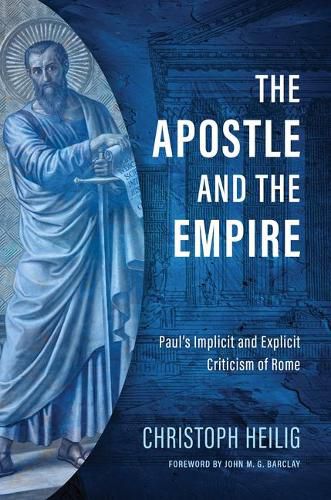Readings Newsletter
Become a Readings Member to make your shopping experience even easier.
Sign in or sign up for free!
You’re not far away from qualifying for FREE standard shipping within Australia
You’ve qualified for FREE standard shipping within Australia
The cart is loading…






Was Paul silent on the injustices of the Roman Empire? Or have his letters just been misread?
The inclusion of anti-imperial rhetoric in Paul’s writings has come under scrutiny in recent years. Pressing questions about just how much Paul critiques Rome in his letters and how publicly critical he could have afforded to be have led to high-profile debates–most notably between N. T. Wright and John M. G. Barclay.
Having entered the conversation in 2015 with his book Hidden Criticism?, Christoph Heilig contributes further insight and new research in The Apostle and the Empire, reevaluating the case for Paul hiding his criticism of Rome in the subtext of his letters. Heilig argues that scholars have previously overlooked passages that openly denounce the empire–for instance, the triumphal procession in 2 Corinthians, which Heilig discusses in detail by drawing on a variety of archaeological data.
Furthermore, Heilig takes on larger issues of theory and methodology in biblical studies, raising significant questions about how interpreters can move beyond outdated methods of reading the New Testament toward more robust understandings of the ways ancient texts convey meaning. His groundbreaking work is a must-read for Pauline scholars and for anyone interested in how one of Christianity’s most important teachers communicated his unease with the global superpower of his day.
$9.00 standard shipping within Australia
FREE standard shipping within Australia for orders over $100.00
Express & International shipping calculated at checkout
Was Paul silent on the injustices of the Roman Empire? Or have his letters just been misread?
The inclusion of anti-imperial rhetoric in Paul’s writings has come under scrutiny in recent years. Pressing questions about just how much Paul critiques Rome in his letters and how publicly critical he could have afforded to be have led to high-profile debates–most notably between N. T. Wright and John M. G. Barclay.
Having entered the conversation in 2015 with his book Hidden Criticism?, Christoph Heilig contributes further insight and new research in The Apostle and the Empire, reevaluating the case for Paul hiding his criticism of Rome in the subtext of his letters. Heilig argues that scholars have previously overlooked passages that openly denounce the empire–for instance, the triumphal procession in 2 Corinthians, which Heilig discusses in detail by drawing on a variety of archaeological data.
Furthermore, Heilig takes on larger issues of theory and methodology in biblical studies, raising significant questions about how interpreters can move beyond outdated methods of reading the New Testament toward more robust understandings of the ways ancient texts convey meaning. His groundbreaking work is a must-read for Pauline scholars and for anyone interested in how one of Christianity’s most important teachers communicated his unease with the global superpower of his day.